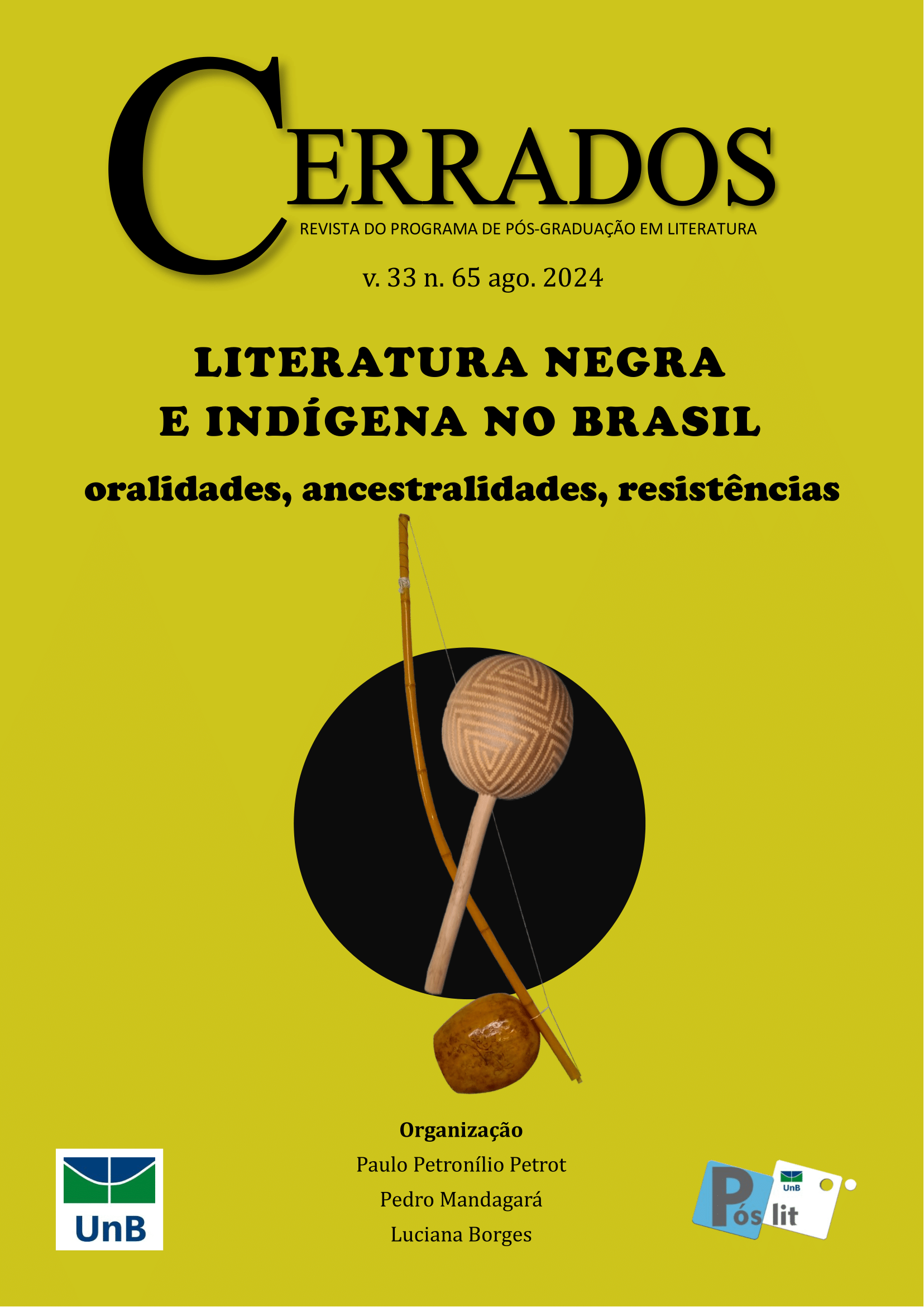Reflections on contemporary indigenous narrative
between tradition and modernity of writing models
DOI:
https://doi.org/10.26512/cerrados.v33i65.53469Keywords:
narratives by indigenous authors, tradition, modernity, forms of writing.Abstract
The general purpose of this study is to discuss the way in which certain contemporary narratives by indigenous authors are structurally and thematically organized. In this sense, in order to evaluate how certain fictional productions stand out in the current critical debate, our specific objective is to analyze the following studies: O filho da ditadura (2009), by Juvenal Payayá; Tardes de agosto: manhãs de setembro: noites de outubro (2013), by Jaider Esbell; and Memórias de índio (2016), by Daniel Munduruku. In our point of view these texts bring peculiar and formal thematic configurations, as well as they intend to escape from the rules which often guide traditional literary theory, history and criticism. This is due to the fact that, by preparing their writings, these authors chose to use a sui generis style, and do they move in order to highlight some aspects inherent to the indigenous and Amazonian universe. It is no coincidence that, no matter how close they are to the novelistic genre, these textual models problematize, among others, the concepts of authorship, emphasizing a performance inherent to the act of narrating, considering that this type of composition circulates with some representations of the imaginary that are distinct from some of the characteristics expressed – through time – by many Western literary currents. For us, this is how the analysis of fictional productions by indigenous authors suggests a kind of transcultural exercise. Therefore, in order to outline our assessment, we have as an analytical support the theories of Fábio Almeida de Carvalho (2023), Walter Mignolo (2017), Mikhail Bakhtin (1998), Fernando Ortiz (1983), among others.
Downloads
References
ALMEIDA, Jorge. Apresentação. In: PAYAYÁ, Juvenal. O filho da ditadura. Amazon Digital, 2009. E-book Kindle.
BAKHTIN, Mikhail. Epos e Romance. In BAKHTIN, Mikhail. Questões de literatura e de estética. São Paulo: UNESP, 1998. p. 397-428.
CARVALHO, Fábio Almeida de. Aspecto da participação indígena na cultura brasileira letrada. Revista de Literatura Brasileira, Brasil/Brazil, A Journal of Brazilian Literature, v. 36, n. 71, [s.l.], 2023, p. 11-28.
ESBELL, Jaider. Makunaima, o meu avô em mim. Iluminuras, Porto Alegre, v. 19, n. 46, p. 11-39, jan/jul, 2018.
ESBELL, Jaider. Tardes de agosto: manhãs de setembro: noites de outubro. Boa Vista, Roraima: Edição do Autor, 2013.
FILHO, Jaime Brasil. Guia de Bordo. In: ESBELL, Jaider. Tardes de agosto: manhãs de setembro: noites de outubro. Boa Vista, Roraima: Edição do Autor, 2013, p. 5-8.
GIACOMOLLI, Dóris Helena Soares da Silva. Literatura indígena e a narrativa da memória: Eliane Potiguara, Daniel Munduruku e Kaka Werá Jecupé. Tese (Doutorado em História da Literatura). Porto Alegre: Universidade Federal do Rio Grande, 2020.
MIGNOLO, Walter. Desafios Decoloniais Hoje. Epistemologias do Sul, Foz do Iguaçu/PR, v. 1, n. 1, p. 12-32, 2017.
MUNDURUKU, Daniel. Memórias de índio: uma quase biografia. Ilustração R. C. 1. Ed. Porto Alegre, RS: Eldebra, 2016.
ORTIZ, Fernando. El contrapunteo cubano del azúcar y del tabaco. Cuba: Editorial de ciencias sociales, La Habana, 1983.
PAYAYÁ, Juvenal. O filho da ditadura. Apresentação Jorge Almeida. Amazon Digital, 2009. E-book Kindle.
SANTOS, Francielle Silva. Juvenal Payayá e a literatura de autoria indígena no Brasil. Dissertação (Mestrado em Literatura e Cultura). Universidade Federal da Bahia, Salvador, 2018.
TETTAMANZY, Ana Lúcia Liberato. Falas à espera de escuta. In: DORRICO, Julie; DANNER, Leno Francisco; CORREIA, Heloisa Helena Siqueira; DANNER, Fernando (Orgs.) Literatura indígena brasileira contemporânea: criação, crítica e recepção (orgs.). Porto Alegre, RS: Editora Fi, 2018, pp.16-24.
Downloads
Published
How to Cite
Issue
Section
License
Copyright (c) 2024 Revista Cerrados

This work is licensed under a Creative Commons Attribution 4.0 International License.
Proibida a reprodução parcial ou integral desta obra, por qualquer meio eletrônico, mecânico, inclusive por processo xerográfico, sem permissão expressa do editor (Lei n. 9.610 de 19/2/1998 )



